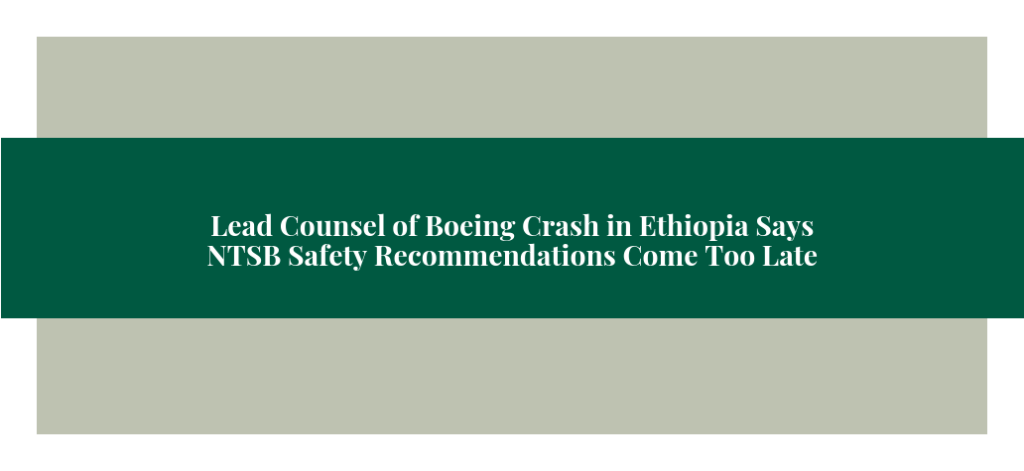Lead Counsel of Boeing Crash in Ethiopia Says NTSB Safety Recommendations Come Too Late;
Robert Clifford Concerned NTSB Safety Recommendations Are Insufficient And Don’t Include Input From Airline Pilot or Accident Victim Organizations –
Looks Forward to October 30 Congressional Hearing on 737 MAX
In the wake of the seven recommendations released September 26th by the National Transportation Safety Board (NTSB) regarding the 737 MAX plane, the Lead Counsel for the families of the victims of the March 10 crash in Ethiopia expressed concern that “It is just too little too late”. Where was the focus on these safety issues before the MAX was even allowed to fly?” questioned Robert A. Clifford, founder and senior partner of Clifford Law Offices in Chicago and Lead Counsel of the consolidated litigation involving the MAX crash in Ethiopia.
For example, one of the NTSB safety recommendations mentions that the “crews did not react in the ways Boeing and the FAA assumed they would.” Clifford responded that has much to do with Boeing’s failure to provide basic flight manual information, training and notice to the pilots about the way the new MAX and its systems were designed, certified, and meant to be operated, something the NTSB Safety Recommendations fail to mention or consider Further, the Boeing and FAA design and certification process failed to include pilot simulator verification of design assumptions, especially with real line pilots from the various international regions and the full range of allowable experience levels such as those flying the accident airplanes.
The families of the Ethiopian 737 MAX accident victims sat down for nearly two hours with Department of Transportation (DOT) Secretary Elaine Chao on the six-month anniversary of the crash, Sept. 10, at which time she stated that the 737 MAX would not be ungrounded as a singular act of the United States. Families said they were promised that the FAA would work in partnership with other international airworthiness authorities in coordinating the ungrounding of the MAX. “Although FAA head Steve Dickson held a meeting Monday with regulators from 50 countries in Montreal on Monday, it does not appear that these NTSB safety recommendations rely on any input from other major countries/regions with high levels of aviation safety experience such as Europe, Canada and Brazil, nor do they appear to have included input from US and international airline pilot organizations or airline accident victim organizations, which they should,” Clifford said.
Clifford mentioned that in Dickson’s opening remarks to the international group on Monday (Sept. 23), Dickson said, “The grounding of the Boeing 737 MAX placed a spotlight on safety and the FAA’s approach to oversight of those we regulate.” Clifford responded, “It was not the grounding of the aircraft but the deaths of 346 MAX passengers that placed that spotlight and raised the international awareness of the need for greater safety of this plane.”
Clifford added that the families appreciate that Congress has formally invited Boeing’s top officials to testify at the U.S. House Transportation and Infrastructure Committee Meeting Oct. 30. “They are most anxious to hear what Boeing’s Chairman Dennis Muilenberg and Chief Engineer of Boeing’s Commercial Airplanes division John Hamilton have to say before the Full Committee,” Clifford said.
For further information, please contact Clifford Law Offices Communications Partner Pamela Sakowicz Menaker at 847-721-0909 (cell). www.CliffordLaw.com

